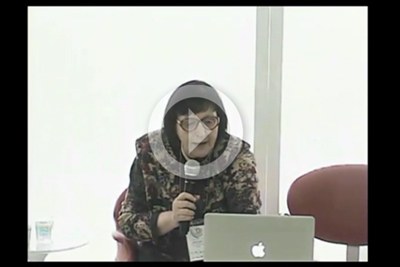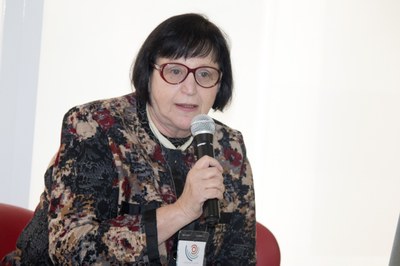A Theory of the Relationship between the Sleep Hormone and the Body’s Defense is the Subject of Regina Markus’ Conference
 Biologist Regina Markus spoke to participants of the Intercontinental Academia (ICA) about the relationship between melatonin, a hormone that regulates sleep, and the activation of the immune system, during the conference Stop, Stop, Stop… A Necessary Pause in the Flow of Time, held on Sunday, April 26.
Biologist Regina Markus spoke to participants of the Intercontinental Academia (ICA) about the relationship between melatonin, a hormone that regulates sleep, and the activation of the immune system, during the conference Stop, Stop, Stop… A Necessary Pause in the Flow of Time, held on Sunday, April 26.
Markus, who is member of the IEA’s scientific committee for the ICA, focused on the temporal organization of biological cycles influenced by variations of light, and particularly on the Theory of Immune-Pineal Axis, developed by her research group at the Chronopharmacology Laboratory of the Institute of Biosciences of the University of São Paulo, which she heads.
According to this theory, when attacked by a pathological agent – e.g., a virus, fungus or bacteria – and has to defend itself quickly, the body forces a temporary halt of its circadian clock, which is responsible for synchronizing internal rhythms and the external environment. During this pause, the regulation of diurnal and nocturnal biological functions becomes secondary and gives way to an innate immune response.
Markus presented a series of experiments conducted in vitro (in the controlled environment of the laboratory) and in vivo (in tissues from living organisms) in her laboratory, which show that the temporary halt of the circadian clock is possible thanks to the two-way communication that exists between the immune system and the pineal gland, located in the central region of the brain and responsible for synchronizing body rhythms and the so-called light/dark cycles.
Related materialRelated new: Carolina Escobar Highlights the Importance of Regular Biological Rhythms to Health |
|---|
Under normal conditions and if the body is not under threat, when night falls darkness stimulates the pineal gland to produce melatonin. The hormone, known as “hormone of darkness” or “sleep hormone,” enters the bloodstream and tells every cell that it is night, paving the way for a state of drowsiness. In contrast, at dawn, the increasing intensity of light inhibits the gland and the production of melatonin ceases, allowing the body to awaken and become active for the day.
This hormonal mediation between body and mind regulates the biological clock, enabling the organism to make the necessary adjustments to maintain the 24-hour life cycles.
A PAUSE IN TIME
However, in the presence of an external threat, the melatonin production is altered and the fine tuning between biological rhythms and ambient light is interrupted.
To reach this conclusion, Markus hypothesized that the functions of the “hormone of darkness” go beyond regulating sleep and extend to defending the organism – or, more specifically, to acting as a blood-brain barrier (the chemical mechanism that filters what can reach the brain).
The barrier acts as a gate; when closed, it prevents leukocytes (the body’s defense cells) in the bloodstream from migrating to healthy tissues and generating an undue immune response, which Markus calls “spurious inflammation.”
Markus explained that melatonin is a key element in the functioning of this barrier: the hormone inhibits the permeability of the cell layer of blood vessels, preventing leukocytes from unnecessarily traversing to tissues.
 However, if pineal receptors receive information that an infectious agent has entered the body, the gland blocks the synthesis of melatonin. In the absence of the hormone, the blood-brain barrier opens and allows the immune cells to pass from the bloodstream to the injured tissue. This creates the necessary conditions for the body to react quickly to the threat of a pathogen, and is the first phase of the innate immune response.
However, if pineal receptors receive information that an infectious agent has entered the body, the gland blocks the synthesis of melatonin. In the absence of the hormone, the blood-brain barrier opens and allows the immune cells to pass from the bloodstream to the injured tissue. This creates the necessary conditions for the body to react quickly to the threat of a pathogen, and is the first phase of the innate immune response.
On the other hand, if melatonin levels in the blood are reduced, then the regulation of the light/dark cycles is compromised and the body cannot synchronize internal rhythms with daytime and nighttime.
According to Markus, that is why the biological clock becomes misadjusted when we are sick. “During the first stage of the immune response, the body needs to stop in time to recover. This is what happens when we have a cold and cannot sleep at night, but are sleepy during the day.”
